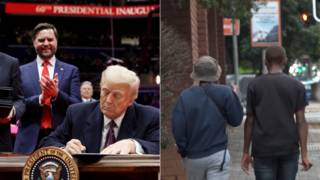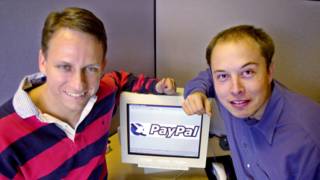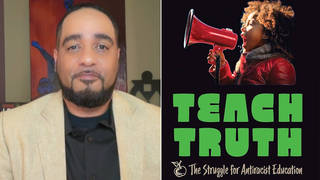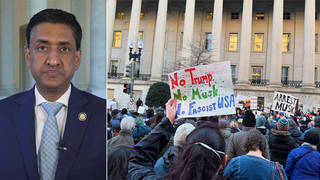
Related
Topics
Guests
- Dr. Nahida Gordonprofessor emerita at Case Western Reserve University. A Palestinian American born in Jerusalem before 1948, she is a member of the steering committee of the Israel/Palestine Mission Network in the Presbyterian Church (U.S.A.).
- Rabbi Alissa Wisedirector of organizing at Jewish Voice for Peace, which supported the Presbyterian Church’s divestment vote.
In what is being hailed as a major milestone for the global campaign to boycott and divest from Israel over its treatment of Palestinians, the Presbyterian Church (U.S.A.) voted to divest from three companies that it says supply Israel with equipment used in the occupation of Palestinian territory. According to the church, the three firms — Motorola Solutions, Caterpillar and Hewlett-Packard — profit from the Israeli occupation of Palestinian land by selling bulldozers, surveillance technology and other similar products. The decision passed by seven votes, 310 to 303, making the Presbyterian Church the largest religious group to vote for divestment. We are joined by two guests: Dr. Nahida Gordon, a Palestinian-American professor who is a member of the steering committee of the Israel/Palestine Mission Network in the Presbyterian Church (U.S.A.); and Rabbi Alissa Wise, director of organizing at Jewish Voice for Peace.
Transcript
AMY GOODMAN: We turn now to a discussion on what’s being hailed as a major milestone for the global campaign to boycott and divest from Israel over its treatment of Palestinians. At its general convention in Detroit Friday, the Presbyterian Church of the U.S. voted to divest from three companies that it says supply Israel with equipment used in the occupation of Palestinian territory. The companies are Motorola Solutions, Caterpillar and Hewlett-Packard. The value of Presbyterian holdings in the companies is about $21 million. According to the church, the companies profit from Israeli occupation of Palestinian land by selling bulldozers, surveillance technology and other similar products. The decision by the Presbyterian Church (U.S.A.) to divest passed by seven votes, 310 to 303, making it the largest religious group to vote for divestment. Two years ago, the assembly rejected a similar divestment proposal by two votes. The vote also supported interfaith cooperation, the right of Israel to exist and a two-state solution.
To talk about the vote’s significance, we’re joined by two guests. In Cleveland, Ohio, Dr. Nahida Gordon is with us, professor emeritus—emerita at Case Western Reserve University. She’s a Palestinian American who was born in Jerusalem before 1948. She’s a Presbyterian, a member of the steering committee of the Israel/Palestine Mission Network in the Presbyterian Church (U.S.A.). In San Francisco, Rabbi Alissa Wise is with us, director of organizing at Jewish Voice for Peace. Her group supported the Presbyterian Church’s divestment decision.
We welcome you both to Democracy Now! I want to begin in Cleveland. Let’s begin with Dr. Nahida Gordon. Explain what happened this time. What made this vote different from the vote before, when this was defeated?
NAHIDA GORDON: I think, with time, more people in the Presbyterian Church, particularly the commissioners who were on the floor of the General Assembly, are beginning to know more of what is really going on in the West Bank, in East Jerusalem and Gaza. Thanks to the news and news sources on the Internet, they’re beginning to see more and more of what is going on in Palestine and the terrible conditions under which the Palestinians are living. And I think we built from the last General Assembly to this assembly, and so we know more, we understand more. And we had some people on the floor who said some wonderful things to explain what is going on. And we organized. We worked very hard for this decision. And we succeeded, and we’re very gratified that we succeeded.
AMY GOODMAN: Can you talk about the companies that the Presbyterian Church will divest from?
NAHIDA GORDON: Yes. We feel that the church would be complicit in the occupation if we remain divested in these three companies. Caterpillar, I don’t know—most people have seen these very huge D9 bulldozers, which are weaponized—they have machine guns on them, and I believe some of them are electrified—destroy houses with just one simple swipe. We’ve seen them uproot olive trees. On May 19th, they used bulldozers to destroy, we believe, between 1,500 and 2,000 fruit trees at the Tent of Nations farm. They build the roads into the West Bank, which are for Israelis only. They have been used in building the separation wall, which goes deep into the West Bank into Palestinian territory. And they help build the settlements.
Now, Motorola Solutions produces fuses for bombs that the Israelis use against the Palestinians. As you well know, they bomb Gaza almost regularly. They also produce surveillance equipment for illegal settlements. These are illegal under international law, and they’re throughout the West Bank.
And Hewlett-Packard produces biometric—amongst other things, produces biometric scanners, which the Israelis use in checkpoints, which are throughout and inside the West Bank. There are—a few of them are on the border between Israel and the West Bank, but the majority, the large majority, are checkpoints within the West Bank.
AMY GOODMAN: Israeli Prime Minister Benjamin Netanyahu criticized the decision by the Presbyterian Church to divest from U.S. companies that operate in the Israeli-occupied territories. He spoke on Meet the Press on Sunday.
PRIME MINISTER BENJAMIN NETANYAHU: It should trouble all people of conscience and morality, because it’s so disgraceful. You know, you look at what’s happening in the Middle East—and I think most Americans understand this—they see this enormous area riveted by religious hatred, by savagery of unimaginable proportions. Then you come to Israel, and you see the one democracy that upholds basic human rights, that guards the rights of all minorities, that protects Christians. Christians are persecuted throughout the Middle East. So, most Americans understand that Israel is a beacon of civilization and moderation.
AMY GOODMAN: We’re bringing in Rabbi Alissa Wise now, director of organizing at Jewish Voice for Peace. Can you respond to Prime Minister Benjamin Netanyahu?
RABBI ALISSA WISE: Sure. Thank you for having me on this morning. You know, I’m concerned about Prime Minister Netanyahu’s framing of, you know, what Israel is, because, quite certainly, as Dr. Nahida Gordon just described, there are really urgent and critical human rights issues that need to be addressed both within the West Bank, Gaza and East Jerusalem, and also there’s a critical issue around lack of basic equal rights for Palestinian citizens of Israel. These are the reasons behind, you know, this Presbyterian call for divestment and the reasons so many around the world are urging divestment as a way to remedy the urgent human rights abuses going on on the ground.
AMY GOODMAN: And what is your role as a rabbi in arguing for this in the Presbyterian Church?
RABBI ALISSA WISE: Well, I just spent the last week in Detroit at the Presbyterian General Assembly. And part of my role was, you know, I was invited there by the Israel/Palestine Mission Network and other friends within the Presbyterian community to serve as a witness and a support to the Presbyterian process. You know, there is—you know, as we like to say in the Jewish community, “Ask two Jews a question, get three opinions.” So, there’s quite a bit of diversity within the Jewish community around these questions around, you know, what to do about what is now a 47-year-old occupation, and how do we—how do we stop these urgent human rights abuses against Palestinians. So, in part, it is to be a strong interfaith partner and support to our friends in the Presbyterian Church, which involves interfaith—strong interfaith partnerships involve kind of staying at the table, even in moments of deep disagreement.
And it is my sincere hope that those in the Jewish community and other faith communities, who might be—you know, disagree with this decision, will stay at the table and, not only that, will actually dig deep to actually hear the message of their Presbyterian brothers and sisters. And, you know, one of the things most frustrating that I find from those others in the Jewish community that oppose the divestment bills is that they have no real practical solution to what to do to end these human rights abuses. You never get to hear their ideas about what will stop settlement construction, what will stop the daily humiliation of Palestinians at checkpoints, what will stop, you know, the bulldozing of olive trees and the demolition of homes. That’s never the conversation at the table. And it’s my sincerest hope that this action by the Presbyterians will push all of us to kind of ask those critical questions.
AMY GOODMAN: I’d like to turn to comments made by the Rabbi Rick Jacobs, the president of the Union for Reform Judaism. He was speaking to CNN in response to the vote.
RABBI RICK JACOBS: I represent the overwhelming majority of the American Jewish community, literally millions, and we are all united. We’re not united about everything, but on this, we are completely united, that this act of divestment, which is—whatever the language says, it is an affirmation of the global BDS, the boycott, divestment and sanctions movement. The global BDS has already claimed this as a great victory. This is a very hurtful act that causes the entire Jewish community not only pain, but a sense of betrayal from the Presbyterian Church.
AMY GOODMAN: Rabbi Alissa Wise, your response?
RABBI ALISSA WISE: Yes, I actually did have the opportunity to speak with Rabbi Jacobs myself when I was in Detroit briefly. We spoke about this very issue. You know, I think that because of the intense muzzling that exists within the Jewish community around these issues—there are severe restrictions that we’ve seen in the past year through the Open Hillel movement, Jewish students on college campus challenging what are truly McCarthyite restrictions on the way that debate and dialogue can happen around Israel and on college campuses—we actually don’t know exactly, you know, how many Jews are supportive of these—this Israel right or wrong idea, or those that are really—want to speak out for justice and feel kind of silenced by the policies of the Jewish community.
Beyond that, I think that, you know, Rabbi Jacobs at the Presbyterian General Assembly made a last-ditch effort to strong-arm the Presbyterians to vote against divestment by offering a last-minute meeting with Netanyahu, which, by all accounts, you know, backfired, because it was seen as a manipulation. And it’s clear that, you know, as I said before, there’s not consensus in the Jewish community on any issue, most certainly on this issue. And I think it does a disservice to the entire Jewish community and, most certainly, to our interfaith partners to misrepresent that.
AMY GOODMAN: How many rabbis signed on to the open letter to the Presbyterian Church, Rabbi Wise?
RABBI ALISSA WISE: You mean the open letter from Jewish Voice for Peace?
AMY GOODMAN: Yes, the—
RABBI ALISSA WISE: Or the open letter from—
AMY GOODMAN: From Jewish Voice for Peace.
RABBI ALISSA WISE: I don’t know the exact number. The truth is that it’s not a numbers game, right? Because of this, you know, there are many rabbis that are supportive of these policies that simply cannot come out of the woodwork, for fear of losing their jobs. Right? So I think that what’s most important is that, you know, Jewish Voice for Peace is an organization that is small and growing and being able to kind of create a space for those in the Jewish community that wish to express these values of a hope for equality, justice and self-determination for Palestinians to really come to light and to bear fruit.
AMY GOODMAN: Finally, Dr. Nahida Gordon, where does the Presbyterian Church go from here?
NAHIDA GORDON: Well, technically, we will now not invest in these three companies. And where we go from here? We need to continue to work for the human rights of Palestinians. We are very much concerned with partners in Palestine, as well as with Israel. What we would like to do—we’re not against the Israeli people. What we would like to do is to see that the government of Israel starts treating the Palestinians better. We would like to see the end of the occupation. We’d like to see Palestinians have their human rights, have freedom. Basically, that’s it. We need to see that the Palestinians have their freedom.
AMY GOODMAN: Dr. Nahida Gordon, I want to thank you very much for being with us, professor emerita at Case Western Reserve University, a Palestinian American born in Jerusalem before 1948, member of the steering committee of the Israel/Palestine Mission Network in the Presbyterian Church. And thanks so much to Rabbi Alissa Wise of Jewish Voice for Peace.
That does it for today’s broadcast. Democracy Now! is hiring a seasoned Linux systems administrator. Visit democracynow.org for more information.











Media Options